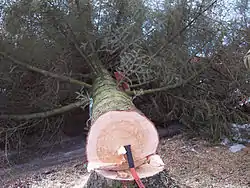伐採
Japanese
| Kanji in this term | |
|---|---|
| 伐 | 採 |
| ばつ > ばっ Grade: S |
さい Grade: 5 |
| on’yomi | |
Etymology
From Middle Chinese compound 伐採/伐采 (bjot tshojX, literally “attack, strike + gather”). More commonly encountered in modern Mandarin with the characters in the reverse order, as traditional 採伐/采伐 (cǎifá) and simplified 采伐 (cǎifá, “to fell / to cut”).
Conjugation
Conjugation of "伐採する" (See Appendix:Japanese verbs.)
| Katsuyōkei ("stem forms") | ||||
|---|---|---|---|---|
| Mizenkei ("imperfective") | 伐採し | ばっさいし | bassai shi | |
| Ren’yōkei ("continuative") | 伐採し | ばっさいし | bassai shi | |
| Shūshikei ("terminal") | 伐採する | ばっさいする | bassai suru | |
| Rentaikei ("attributive") | 伐採する | ばっさいする | bassai suru | |
| Kateikei ("hypothetical") | 伐採すれ | ばっさいすれ | bassai sure | |
| Meireikei ("imperative") | 伐採せよ¹ 伐採しろ² |
ばっさいせよ¹ ばっさいしろ² |
bassai seyo¹ bassai shiro² | |
| Key constructions | ||||
| Passive | 伐採される | ばっさいされる | bassai sareru | |
| Causative | 伐採させる 伐採さす |
ばっさいさせる ばっさいさす |
bassai saseru bassai sasu | |
| Potential | 伐採できる | ばっさいできる | bassai dekiru | |
| Volitional | 伐採しよう | ばっさいしよう | bassai shiyō | |
| Negative | 伐採しない | ばっさいしない | bassai shinai | |
| Negative continuative | 伐採せず | ばっさいせず | bassai sezu | |
| Formal | 伐採します | ばっさいします | bassai shimasu | |
| Perfective | 伐採した | ばっさいした | bassai shita | |
| Conjunctive | 伐採して | ばっさいして | bassai shite | |
| Hypothetical conditional | 伐採すれば | ばっさいすれば | bassai sureba | |
| ¹ Written imperative ² Spoken imperative | ||||
References
- Matsumura, Akira, editor (2006), 大辞林 [Daijirin] (in Japanese), Third edition, Tōkyō: Sanseidō, →ISBN
This article is issued from Wiktionary. The text is licensed under Creative Commons - Attribution - Sharealike. Additional terms may apply for the media files.
